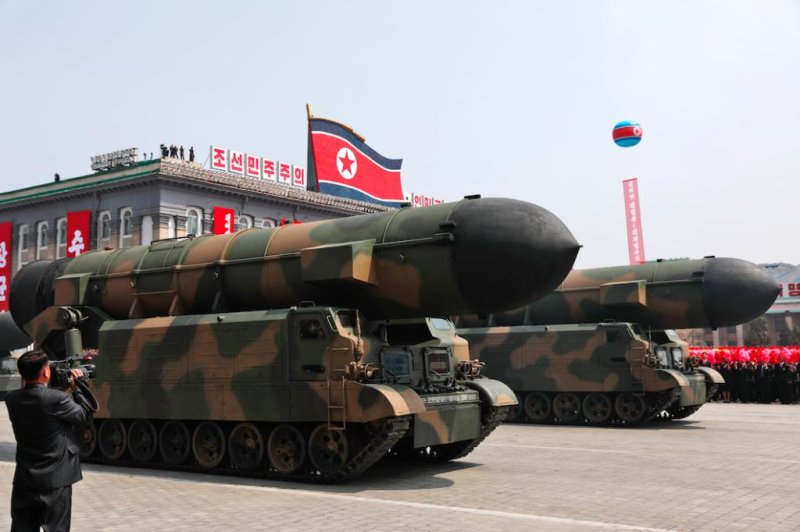North Korea is not finished with testing weapons that could capture U.S. attention, an analyst said in New York on Thursday. File Photo by How Hwee Young/EPA
NEW YORK, Nov. 9 (UPI) -- North Korea may have refrained from provocations for more than a month, but the country could take on one more test to convince the United States it is capable of hitting Washington or New York.
Ralph Cossa, president of the Pacific Forum of the Center for Strategic and International Studies, said on Thursday it's unclear why North Korea has stopped testing weapons since late September.
But one reason for the silence could be the absence of sanctions.
North Korea already expressed its dissatisfaction with United Nations Security Council sanctions Resolution 2375 on Sept. 15, when Pyongyang conducted a ballistic missile test in open defiance of the resolution.
"After the last U.N. Security Council resolution, which was after the nuclear test they immediately launched their missiles over Japan," Cossa told UPI at The Korea Society. "There wasn't a new U.N. Security Council resolution after that, which removed the incentive for North Koreans to have to yet do something else."
While events in the relatively isolated state cannot be verified, incidents at the Punggye-ri nuclear site could have affected October plans.
"It could be as simple as the next thing they had planned was a nuclear test and the mountain collapsed, so right now they're trying to dig a new hole somewhere," Cossa said, referring to a recent Japanese news report of a tunnel collapse that could have killed as many as 200 people. "But we don't know. When it comes to North Korea, we're all guessing."
But Cossa also said given recent developments the Kim Jong Un regime would not shy away from one more test that could persuade the United States to rethink its policies.
"I think the North Koreans probably feel they need to do at least one more extended range missile test to demonstrate a true ICBM capability, since we haven't given them credit," Cossa said.
Pyongyang could conduct a future test using a "dummy warhead."
If the missile survives reentry, the United States could reassess North Korea's long-range missile capabilities, the analyst said.
North Korea would then use nuclear weapons as leverage in negotiations.
"Once they are convinced that we are convinced that they're capable of hitting Washington and New York they will then put their nuclear capabilities in their pocket, and be very agreeable to talking about a freeze," Cossa said. "But it won't be a freeze for a freeze, as China and others have recommended, it will be a freeze for aid or a lifting of sanctions."
Cossa, who has met with North Korean officials for informal talks, said Pyongyang's delegates have increasingly been signaling an interest in the lifting of sanctions.
"References to lifting sanctions come a lot more now than they used to," the analyst said, adding at some point North Korea will need easing of sanctions if they want to pursue nuclear weapons and economic development.
"They clearly cannot do them simultaneously," Cossa said, adding there is a possibility China would settle for a freeze.
Trump was in China on Thursday, and it is likely he raised the issue of North Korea with Chinese President Xi Jinping, who Trump previously described as a "powerful man" and a "very good person."
Cossa said Trump's reaffirmation of alliances with Japan and South Korea was a welcome change from the unpredictability of the administration.
"I always thought there were two important messages [we had] for the North Koreans," Cossa said. "If you initiate hostilities, you're going to die.
"Secondly, if you are prepared to sit down and talk, we can have a discussion."
Trump did "throw out the idea of dialogue" during his speech before South Korea's National Assembly, the analyst said.
But conditions for talks should not differ from those set by the Obama administration, he added, adding the minimum requirement is a North Korean willingness to reverse its nuclear weapons program.
"We have to agree the talks will be about denuclearization," the analyst said.















